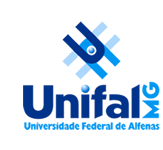The Federal University of Alfenas-MG, originally the School of Pharmacy and Dentistry of Alfenas (EFOA) was founded in 1914. In 1960 the School was federalized and in 2001 it became Federal University Center (EFOA / CEUFE). In 2005 the institution was transformed into the Federal University of Alfenas (UNIFAL-MG), beginning the expansion (expansion 1) of undergraduate courses. In 2007 UNIFAL-MG joined REUNI (expansion 2) and in 2009 there was a major multi-campus expansion (expansion 3) with the creation of advanced campuses in Poços de Caldas-MG and Varginha-MG. Today UNIFAL-MG offers 33 face-to-face undergraduate courses distributed over its three campuses (24 in Alfenas, 4 in Poços de Caldas and 5 in Varginha). Although it is only fifteen years old as a Federal University, the institution has 106 years of excellence in undergraduate teaching as a HEI. However, for historical reasons, the stricto sensu graduate program only started its activities at the institution after its transformation into a university in 2005 with the beginning, in the same year, of the master’s course of the graduate program in Pharmaceutical Sciences, the first to recommended by CAPES. Today UNIFAL-MG has 22 master’s degrees and 5 doctorates, most of them with less than 10 years of experience and none of them with a grade higher than 4. As can be seen, graduate studies are in the consolidation phase in the institution as a whole.
The history of Chemistry at UNIFAL-MG is confused with the birth of the Federal University of Alfenas and its post-graduation. The Bachelor of Chemistry course with technological assignments started its activities in 2003 two years before the transformation of EFOA / CEUFE into UNIFAL-MG. The Chemistry course was the institution’s sixth undergraduate course. Accompanied by all the institutional growth where the 6 undergraduate courses in 2003 were today 33 courses, there was also a strong growth of Chemistry in the institution. In 2007 the Chemistry Degree course was created and in 2008 the Chemistry Degree EAD Graduation course started.
Approved in response to the APCN sent to CAPES in 2007 and beginning its activities in March 2008, the Master’s Course of the Graduate Program in Chemistry (PPGQ) at UNIFAL-MG is the second longest-lived institution, having completed at the end 2019 only eleven years of operation. The PPGQ master’s course, approved with grade 3, came to join the Master’s course in Pharmaceutical Sciences that had started its activities three years before. Therefore, only 5 years after the implementation of the Graduation in Chemistry, the institution also started to have a Master’s Degree in the area. This showed the motivation, engagement, commitment and, mainly, the high qualification of the Chemistry faculty that had been hired to start the Bachelor’s course at the institution a few years before. Following this fast-growing bias, the PPGQ master’s course scored 4 in its first assessment, in the 2007-2009 triennial. And this was undoubtedly a remarkable recognition of its quality, considering that CA da Química based its analysis only on production data for 2008 and 2009, since in 2007 the program did not yet exist. The increase in the CAPES score brought even more confidence and motivation to the faculty and managers at the time (Coordination and Dean of Research and Graduate Studies) who decided to send a doctoral proposal to CAPES in 2011. The proposal for doctorate was approved consolidating the growth trend of activities and research and training of human resources in the area of Chemistry at the institution. The PPGQ doctoral course started in 2012, which established an important institutional framework for being its first Doctoral Course. According to the report, you can say that the Chemistry area is a consolidated area at UNIFAL-MG, having its own Academic Unit (Chemistry Institute), two Undergraduate courses, the Bachelor of Chemistry (day) and Degree in Chemistry (night), and a postgraduate degree with master’s and doctorate levels.
After the beginning of the PhD course activities in March 2012, the PPGQ was submitted to two other CAPES assessments, the 2010-2012 triennial and the 2013-2016 quadrennial, maintaining grade 4. Obviously, there was no prospect of reaching the note 5 in the 2010-2012 triennial, since the doctorate was just beginning. In the 2013-2016 quadrennial there was a certain expectation of growth, in view of the title of our first doctors (9 defenders) and an accumulation of 99 master’s degrees. However, the note remained. The prospect of a grade increase is obviously greater for this second assessment within the “four-year model”, the third as grade 4 and the second having a doctorate level.
Another important point to be mentioned in relation to the history of PPGQ is its adhesion in 2014 as a nucleus institution of the Multicentric Graduate Program in Chemistry of Minas Gerais (PPGMQ-MG), which currently has 3 nucleating HEIs and 11 associated HEIs. The proposal was submitted by the mining chemical network based on the diagnosis that there was a large number of researchers distributed throughout the vast mining territory, with proven capacity in their respective areas of activity, but geographically isolated in their region, lacking an objective mechanism. that allows scientific collaboration with other research groups, and the PPGMQ-MG could play this role. The association allows the sharing of large and medium-sized equipment, without the need for all HEIs to have all equipment.

